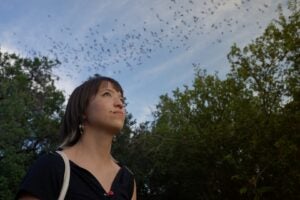AUSTIN, Texas –Pioneering research under way at The University of Texas at Austin to develop improved techniques to diagnose and treat diseases such as cancer and heart disease received a boost today thanks to a $2.499 million grant awarded by the National Science Foundation.
The funding, which will be distributed over five years, is aimed at promoting integrative graduate education and research training (IGERT). UT Austin officials said the grant will enable the University to continue its commitment to training the nation’s top science and high tech students.
The grant was awarded to the University for a project led by Dr. Rebecca Richards-Kortum, associate professor of electrical engineering, whose primary research interest is in bio-medical engineering. The project is titled, “A New Pathway for Multi-disciplinary Graduate Education in Optical Molecular Biology.”
“Most traditional graduate programs concentrate on a single aspect of this field,” Richards-Kortum said. “This training grant will establish an interdisciplinary pathway which synthesizes these fields in a single degree. We believe this program will produce graduates who are uniquely qualified to carry out interdisciplinary research and development in optical biomolecular engineering.
“In developing this pathway, we took care to maintain excellence in research training, to control time to graduate, to develop effective programs to help students relate their research and education to industry, and to provide career advice and access to information on employment possibilities. We believe the program will produce more versatile scientists and engineers who will better serve the future economic needs of the country.”
The program is a joint effort of 14 scientists and engineers from the departments of botany, chemistry, chemical engineering, electrical and computer engineering, mechanical engineering, physics, and zoology. This group of scientists and engineers has established research collaborations and has interacted extensively throughout the existing graduate programs in molecular biology and biomedical engineering at UT. Their collective expertise will provide the intellectual underpinning for the training of a diverse cadre of some 70 graduate students over the five-year tenure of the award.
Optical molecular biology is a bold, emerging field that brings together advanced optical technologies such as lasers, fiber optics and sensitive photodetectors with computers. Recent advances in optical technologies enable dynamic visualization and manipulation of processes within single cells and tissues with nanoscale resolution, which researchers believe will lead to fundamental advances in cell biology and diagnostic medicine.
Using these technologies, UT Austin Professor Jonathon Sessler is working to develop expanded porphyrins for cancer diagnosis and treatment. Systems he has developed currently are being tested clinically as radiation and optically based anticancer agents and have shown considerable promise for the diagnosis of both neoplastic (cancer) and vascular disease (heart disease).
The highly inter-disciplinary nature of Sessler’s research provides ample opportunities for education in areas that go far beyond those traditionally associated with organic chemists. Indeed, techniques such as optical imaging and real time analysis are critical to the success of his translational research.
Examining optical interactions vs. wavelength (spectroscopy) provides another method to analyze biological specimens. Specifically, spectroscopy can provide information about tissue molecular and cellular composition. Richards-Kortum, in collaboration with Dr. Michele Mitchell at the UT MD Anderson Cancer Center, is developing and testing spectroscopic systems for minimally invasive diagnosis of epithelial precancers in the cervix.
Because tissue spectra can be recorded remotely, in real time, without tissue removal and data analysis can be automated, optical diagnosis can afford many advantages over traditional techniques. These include the potential to reduce the need for clinical expertise and the number of unnecessary biopsies, to enable combined diagnosis and therapy in those patients who might benefit and the potential to reduce health care costs.
Vice President and Dean of Graduate Studies, Dr. Teresa Sullivan, called the award, “critical recognition for the pathbreaking work going on in graduate departments across the UT Austin campus, and particularly integral in bringing a broad-based interdisciplinary experience, with real world consequences and benefits, to the young careers of graduate students.”
An integral component of the IGERT program is the corresponding weekly seminar series that brings together IGERT students and faculty and provides a general overview of the field from outside experts from industry, government labs and academia. Both master’s and Ph.D. students register for this seminar course during their first three semesters in the program. The goal of the seminar series is twofold: first, to provide students with direct information about career opportunities in the field; second, to bring together students and faculty from multiple disciplines on a regular basis.”Cutting-edge projects like these are particularly important in recruiting. These awards are critical to help UT Austin continue to provide state-of-the-art training and experience and compete with the top campuses in the country for the nation’s best students,” Sullivan added.
The award is part of a $40.5 million, five-year project of the National Science Foundation. Seventeen doctoral-granting institutions will receive awards to help universities prepare young scientists and engineers for a broad range of emerging career opportunities in the high-end knowledge work that will dominate the next century in industry, government and academe.
Students will receive in-depth interdisciplinary education and research experience, as well as such career development skills as communication, teamwork, experience with modern instrumentation and international awareness.
For additional information on the IGERT project, visit http://www.ece.utexas.edu/igert/igert.html
NOTE to MEDIA: Source contacts are: Dr. Rebecca Richards-Kortum (512) 471-2104, Dr. Jonathon Sessler, 471-5009, and Dr. Teresa Sullivan, 471-4511.



